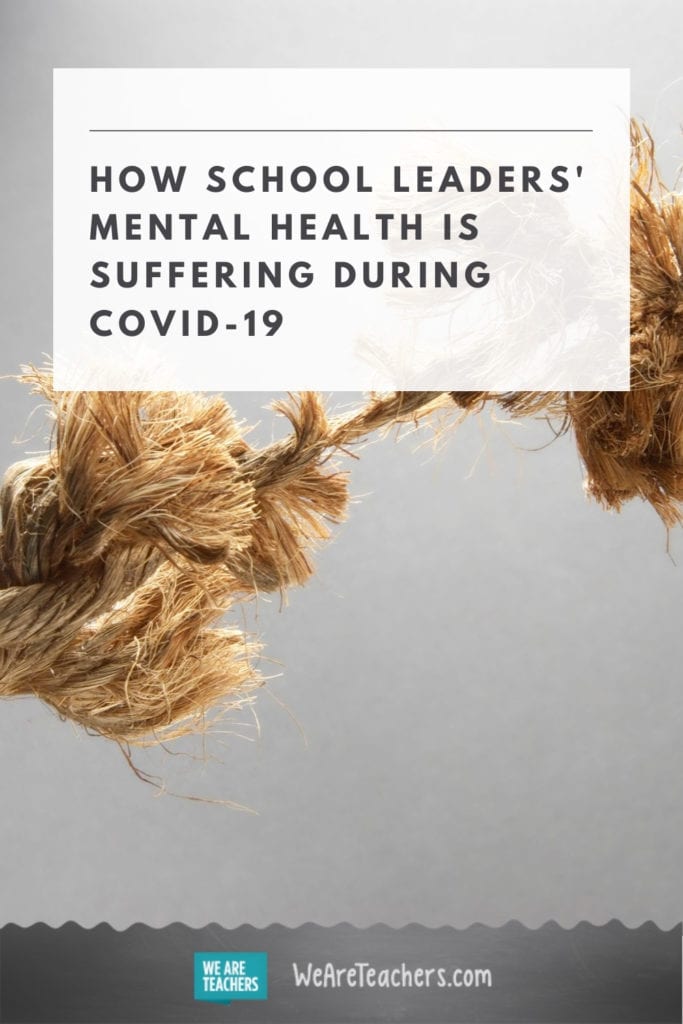In March, school leaders across the country had barely a hot second to prepare for months of virtual learning. Now, with little or no break, they are spending their summers scrambling to create back to school plans. This as state guidance changes often and repeatedly. They are burnt out, stressed out, and trying to run schools from home. All while pleasing the stakeholders in the community and maintaining their own family lives amidst a pandemic. Oh and yeah, self-care. If you haven’t checked on your principal lately, their mental health during the pandemic planning may be suffering. It’s time to see how things are going.
What break? Even when they are “off” they aren’t off
Typically, administration staff members get from 1-4 weeks off in the summer, but this summer is different for some. Even when they are “off,” there are constant Zoom calls to attend to strategize for the fall, state guidelines to keep up with, and parent and community emails to respond to as everyone wonders what type of fall we will have.
Saundra Russell Smith, an elementary school principal near Chicago said, “I took two whole weeks off. Ok, I lied. I tried but I was on two Zoom meetings, answered a few parent messages, and stupidly checked my email at least twice, sending me into about two hours of extra work on my off days.” She said the impending doubled workload she’d face if she completely disconnected kept her partially working during her time off.
The ongoing nature of society constantly talking and posting about COVID makes it hard for admins to truly stop thinking about the situation even when they are off. Eric Hartfelder, a principal in a Nashville, TN elementary school, said, “It’s hard to unplug for long periods of time because circumstances change so quickly. Additionally, even if you’re at the beach, news newspapers, and conversations are all centered around COVID. And with that, you can’t help but start thinking about your school, staff, kids, and families.” One trick he’s found to help is to strive for smaller breaks. A “day here, an afternoon there, late morning in, just ways to grab additional time to relax and enjoy family.”
Working from home blurred the separation of work and home life
Others canceled their time off completely and have been working through the summer. The goal? Plan for fall pandemic-related issues, such as how to social distance a building full of students. Daniel Ludvigson, a principal and superintendent in a K-12 building in North Dakota said, “What vacation I had planned for got canceled and I worked virtually around the clock for at least a few weeks.” For him, working from home made it harder to distinguish work and home time, which he said was an “already blurry line.”
“Constantly being on-point and negotiating between frustrated parents and hard-working teachers was draining. Many people were great but I am sure we can all say some people are never happy…”. Others found the work from home dynamic to be a bit more helpful, like Dr. Ann Jayne, a principal in Tracy, CA. “I took advantage of the stay at home time, and the lack of daily discipline [issues], to do all of y usual late July/early August paperwork such as the Emergency Plan.”
Mental health experts in the education space agree that the work from home/family life balance can muddy the waters for leaders who already may have struggled with that previously. Dr. Sarah Howling, an international school principal and coach to educational leaders across the world, said admins never really “switch off” even in the best of times. “Working from home has meant that there is even less separation between home and school with 16 hour days the norm. High levels of anxiety are reported because of the uncertainty and the inability to give answers to staff, parents, and…students.”
After caring about everyone else’s mental health, theirs is falling by the wayside
With the focus on students’ and teachers’ mental health in the media and in schools for the last few months, Jamie Goodhard, principal of a pre-k-8 school in Chattanooga, TN, said “Sometimes people forget how hard this has been on us too.” She was exhausted by the end of the year and was able to recharge by sitting beachside in mid-June. “While I attended some Zoom meetings and checked email daily, I also sat on the beach and read non-work related books, walked every day and spent time with my family. It was totally the reset I needed.” She hopes to take Fridays off in July but says it “may not happen.”
Dr. Claudia Luiz, a private practice clinician has treated teachers, educational consultants, and a superintendent over the past few months, and said the “new level of decision making is almost constant,” which affects the work-life balance. In addition, no blueprint exists and everything seems to require reinvention “People in education are givers. They typically don’t think selfishly. So it’s harder to deal with their body’s demands for rest and relaxation, which is required given the demands on time and having to make sometimes very difficult decisions.”
Experts weigh in on how to keep positive and help principal mental health during the pandemic
Luiz recommends:
- Checking in emotionally with colleagues. Support them and validate that “overwhelm is the new normal.”
- Thinking big. Keep our eyes on the greater good and the “other side” of this challenging time
- Avoiding fear of failing people. “They should not be afraid of people being frustrated, disgruntled, paranoid or angry. Often authority figures are the people who become receptacles for emotion. Allow these toxic, pain-riddled emotions to ride over you knowing you cannot make everybody happy.”
Howling also recommends some tips for sanity:
- Don’t spend energy resisting/fighting something you can’t change.
- Take deep breaths three times per day for three minutes at a time.
- Be an “intentional connector” with others who nourish your spirit.
- Consider a coach “to help conquer the isolation. Having a confidential thinking partner can be life-saving from a practical and an emotional level, but few leaders do.”
Psychotherapist Jennifer Tomko in Jupiter, FL adds her tips as well for overwhelmed admins:
- Define “me-time” in your own way, from binge-watching a stimulating TV show to quiet yoga.
- Exert your frustrations through physical movement.
- Connect with others over a Zoom happy hour, group therapy session, or social media.
- Talk or write about your stressors.
- Find a community of others going through this, such as the Facebook group Principal Life.
Hartfelder was inspired by the advice he recently heard from Wes Bender, who works with schools on the Leader in Me project. Even though there is a pandemic, that doesn’t mean we as leaders have to personally be in crisis. Look for opportunities, be innovative in your solutions, and focus on taking care of people.
What is your advice for helping principal mental health during the pandemic planning? Share on our Principal Life group on Facebook.
Also, Principals Around the Country Ponder the Best Fall Schedules.

